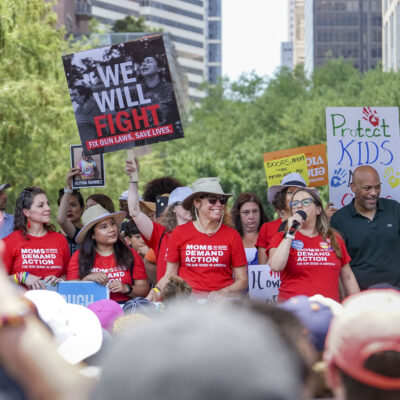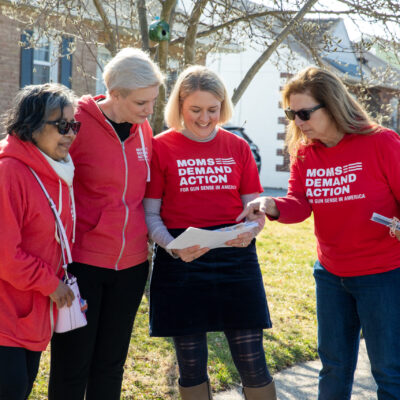New Report Explores How Weak Laws Allow Domestic Abusers and Stalkers to Buy and Keep Guns, Calls on Political Leaders to Close Loopholes to Save Women’s Lives
6.18.2014
A new report from Everytown for Gun Safety and Moms Demand Action for Gun Sense in America released today, “Guns and Violence Against Women: America’s Uniquely Lethal Domestic Abuse Problem”, explores how our country’s weak gun laws allow domestic abusers and stalkers to continue buying and owning firearms. The report includes a first-of-its-kind analysis of domestic violence laws in all 50 states and outlines policy recommendations lawmakers can take to save women’s lives given that, when it comes to gun violence, the most dangerous place for a woman in the developed world is America. Everytown and Moms Demand Action have been working to close the loopholes that make it easy for abusers to get guns – and in just the last six months, six states have passed laws to keep guns out of these dangerous hands.
“Insufficient and lacking gun laws on both the state and federal levels are at the heart of the problem with gun violence against women in our country,” said Shannon Watts, founder of Moms Demand Action for Gun Sense in America, a part of Everytown for Gun Safety. “That’s why we’ve been calling on our political leaders to pass reasonable reforms – and already this year six states have passed bipartisan-supported laws that will keep guns out of abusers’ hands. Women’s lives are on the line and we are going to keep fighting for their safety.”
“In states that require background checks for all handgun sales, 38 percent fewer women are shot to death by their intimate partners,” said John Feinblatt, president of Everytown for Gun Safety. “It’s clear that strong gun laws make a difference – that’s why states with both Republican and Democratic governors are taking action to close the loopholes that allow dangerous people to get and keep guns. It’s time for Congress and other states to step up and pass reforms to keep guns out of the hands of domestic abusers and stalkers.”
The report assesses loopholes in federal law and includes the first summary of domestic violence laws in all 50 states, which uncovers the four gaps in the law that are particularly harmful to American women:
- Federal law does not keep guns out of the hands of abusive dating partners or convicted stalkers. Even though more women in the U.S. are killed by dating partners than by spouses, the federal laws prohibiting domestic abusers from buying or owning guns do not apply to dangerous people convicted of misdemeanor stalking offenses or to dating partners. A forthcoming Everytown analysis found that in 24 percent of mass shootings in which the perpetrator targeted an intimate partner, the two had never married or had a child together and would likely not qualify as intimate partners under current law.
- Most state gun laws fail to protect domestic violence victims. In 35 states, state law does not prohibit all people convicted of misdemeanor domestic violence crimes and all people subject to restraining orders from buying or using guns. So while domestic abusers in those states cannot possess guns under federal law, local law enforcement and prosecutors do not have the tools they need to enforce those restrictions.
- Federal law and the law in most states, allows domestic abusers and stalkers to easily evade gun prohibitions by purchasing guns from unlicensed, private sellers. Federal law only requires background checks for gun sales at licensed dealers. Sixteen states require checks on all handgun sales, but in the remaining states, prohibited abusers seeking to avoid a background check have little trouble purchasing a gun from an unlicensed seller they meet online or at a gun show. Prohibited domestic abusers are well aware of this loophole—and have taken advantage of it to deadly effect. In a first-of-its-kind investigation of illegal online gun sales, Mayors Against Illegal Guns found that one of four prohibited purchasers seeking guns online had a domestic violence arrest.
- Forty-one states do not require all prohibited domestic abusers to relinquish guns they already own. Without a clear law on the books that provides an enforceable process by which offenders relinquish their firearms, it is too easy for dangerous abusers to keep their guns even after they are prohibited.
These loopholes are major contributors to the deadly relationship between domestic violence and guns, as original research by Everytown shows:
- American women are 11 times more likely to be murdered with a gun than women in any other developed country.
- The presence of a gun in a domestic violence situation makes it five times more likely that a woman will be murdered.
- More than half of women murdered with guns in the U.S. in 2010 — at least 54 percent — were killed by intimate partners or family members.
- Over the past 25 years, more intimate partner homicides in the U.S. have been committed with guns than with all other weapons combined.
- And the latest research by Everytown for Gun Safety establishes that this is also true for mass shootings: an analysis of every mass shooting in the U.S. between January 2009 and June 2014 determined that in 57 percent (61 of 107 incidents), the shooter killed an intimate partner or family member.
New State Laws and a New Federal Bill
In just the first half of 2014, Everytown and Moms Demand Action have worked with domestic violence prevention advocates to pass important bills in six states that will help keep guns out of the hands of domestic abusers. These measures have been passed by state houses with bipartisan support and signed into law by governors of both parties, including both Wisconsin Governor Scott Walker and Louisiana Governor Bobby Jindal.
- Louisiana: Governor Bobby Jindal signed into law legislation that will bar people convicted of misdemeanor crimes of domestic violence from possessing a firearm for a period of 10 years. Violators can be charged with a felony and imprisoned for one to five years and fined $500 to $1000.
- Minnesota: Governor Mark Dayton signed into law legislation that will do several things to keep guns out of the hands of domestic abusers. First, the bill prohibits those subject to a domestic violence restraining order (DVRO) from buying or possessing guns. Second, the bill closed “the long gun loophole” by prohibiting convicted domestic abusers from buying or possessing all guns—not just handguns. Finally, the bill established a procedure to ensure that convicted stalkers and domestic abusers relinquish their guns to law enforcement, a licensed dealer, or a trusted third party once they become prohibited from possessing them.
- New Hampshire: Legislators passed a law that creates a new domestic violence crime clarifying which spousal abusers are prohibited from purchasing guns. This ensures that the proper records of spousal abusers will be entered into the National Instant Criminal Background Checks System (NICS) and also that dangerous domestic abusers in New Hampshire will definitively fail background checks when they try to buy a gun at a licensed dealer.
- Washington State: The state passed a law to prohibit individuals subject to DVROs from buying or possessing guns. The new legislation also requires these individuals to relinquish their firearms.
- Wisconsin: Governor Scott Walker signed the SAFE (Stopping Abuse Fatalities through Enforcement) Act. The law will require courts to verify that domestic violence offenders relinquish their guns.
- Vermont: State legislators passed a bill that sets forth a relinquishment procedure for guns possessed by prohibited purchasers. Once a DVRO has been established, courts will direct prohibited purchasers to turn over their firearms to law enforcement, licensed gun dealers or a third party. That third party must sign an affidavit acknowledging they will be held in contempt if the firearm is improperly returned to its original owner.
Progress to keep guns out of the hands of abusers is also being made on the federal front. Recently Senator Amy Klobuchar introduced S.1290, the Protecting Domestic Violence and Stalking Victims Act, to add stalkers and dating partners to the list of federally prohibited gun purchasers by updating the definition of persons convicted under the Misdemeanor Crimes of Domestic Violence (MCDV) to match the definition in the Violence Against Women Act (VAWA). It is expected to attract broad, bipartisan support.





